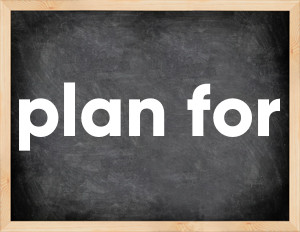 The English verb 'plan for' is pronounced as [plæn fɔː].
The English verb 'plan for' is pronounced as [plæn fɔː].
Related to:
phrasal verb.
3 forms of verb plan for: Infinitive (plan for), Past Simple - (planned for), Past Participle - (planned for).
Here are the past tense forms of the verb plan for
👉 Forms of verb plan for in future and past simple and past participle.
❓ What is the past tense of plan for.
Plan for: Past, Present, and Participle Forms
| Base Form | Past Simple | Past Participle |
|---|---|---|
| plan for [plæn fɔː] |
planned for [plænd fɔː] |
planned for [plænd fɔː] |
What are the 2nd and 3rd forms of the verb plan for?
🎓 What are the past simple, future simple, present perfect, past perfect, and future perfect forms of the base form (infinitive) 'plan for'?
Learn the three forms of the English verb 'plan for'
- the first form (V1) is 'plan for' used in present simple and future simple tenses.
- the second form (V2) is 'planned for' used in past simple tense.
- the third form (V3) is 'planned for' used in present perfect and past perfect tenses.
What are the past tense and past participle of plan for?
The past tense and past participle of plan for are: plan for in past simple is planned for, and past participle is planned for.
What is the past tense of plan for?
The past tense of the verb "plan for" is "planned for", and the past participle is "planned for".
Verb Tenses
Past simple — plan for in past simple planned for
(V2).
Future simple — plan for in future simple is plan for (will + V1).
Present Perfect — plan for in present perfect tense is
planned for
(have/has + V3).
Past Perfect — plan for in past perfect tense is
planned for
(had + V3).
plan for regular or irregular verb?
👉 Is 'plan for' a regular or irregular verb? The verb 'plan for' is .
Examples of Verb plan for in Sentences
- I must tell you that you upset all my plans for the weekend (Present Simple)
- What have you planned for today? (Present Perfect)
- I gather that was when you told her about your plans for this garage (Past Simple)
- Christopher and I didn't exactly plan for this to happen (Past Simple)
- We've been planning for a trip across Europe for months now (Present Perfect Continuous)
- It was a change we'd planned for some time (Past Perfect)
- Looks like we have a lot of romantic activities planned for you (Present Simple)
- They've been planning for war (Present Perfect Continuous)